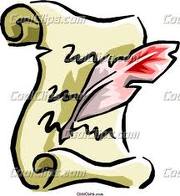Scholarship

“Scholarship” is a musty word, redolent of ancient manuscripts stored on dark shelves in obscure libraries. It is best experienced, I believe, in a library at Yale known as the “Mudd Library” in which the “stacks” are – I love it – the Mudd Stacks.
I well remember my first entrance into those hallowed precincts. The document for which I was looking was said to be on the fourth floor. I showed my “affiliate” card to the guard, passed through to the elevator, and rose to the fourth level. The door opened and I stepped out into a realm of darkness. Shadowy stacks were visible ahead but no light switches were evident. Uncertainly, I stepped forward – and the lights blazed on. Motion sensitive lighting in this ancient realm!
I found the shelf and the number, lifted down the box, untied it, opened it, and took out a package tied with a pink ribbon wherein was the crumbling document for which I was searching.
Now that’s scholarship. Had the motion sensitive lights been replaced with guttering candles, it would have been perfect.
More recently I have been pondering the word “scholarship” again since a publisher to whom my agent submitted a draft of my current project responded that he wondered whether “the scholarly underpinnings were strong enough.”
My agent responded by inquiring whether the 45 pages of end notes had been lost in transmission.
And I responded by narrating another day of scholarly endeavor in stark contrast to the Mudd Stacks.
I have been attempting to establish the date of death of James W. C. Pennington’s second wife. If, as I suspected, she died in 1867, this would explain why he left the work he was doing in Mississippi, sold the house they had lived in on 26th Street in Manhattan, and took charge of a congregation in Maine. But no record of Pennington’s life so much as mentioned her death.
I spent a day at the New York Public Library and found no record of her death prior to 1866 or after 1870, but the records for 1866-1869 were not in the NYPL. I would need to go to the Municipal Library downtown on Chambers Street.
Last week I made that journey by train and subway and found my way to Room 103 of the Municipal Archives. Why is it that government offices of this sort are so shabby? A clerk dressed like a janitor told me to sign in and pay him $5; a copy of any record I found could then be obtained for $11. He directed me to a file cabinet crammed with thin microfilms in battered boxes. I found 1866. There were two films for ordinary deaths (A to M and N to Z) as well as one for “cholera deaths” and one for “coroner deaths.” I searched them all without result. There was, oddly, only one film for 1867. I scanned through to P and there it was: Pennington, Almira; date of death: April 6; cause of death: peritonitis. The lines for “name of parents” was blank, but I don’t really need to know that. I thought the laconic response to “occupation – wife” was somewhat inadequate since she had played an active role in Pennington’s work, but I had the date and it made sense of many things. I saved eleven dollars by copying it out in longhand on recycled paper.
I then added up the “cost of scholarship:”
Train $19.50
Subway 4.50
Parking 3.00
Research fee 5.00
TOTAL $32.00
And all that to find one date!
The next day I sat down at my computer hoping to learn what it was like in Vicksburg, Mississippi, when Pennington was there and hoping I wouldn’t need to go to Mississippi to find out. In a matter of minutes I had downloaded sections of a splendid book published in 1960 that provides reams of information. For free!
What is scholarship? It’s the crumbling Mudd Stacks and the shabby Municipal archives, the Connecticut highways that take me to Yale and the city subways – and the internet. They say that someday it will be only the last of these. If so, life will be less interesting.
 Christopher L. Webber
Christopher L. Webber